 Petzlover
Petzlover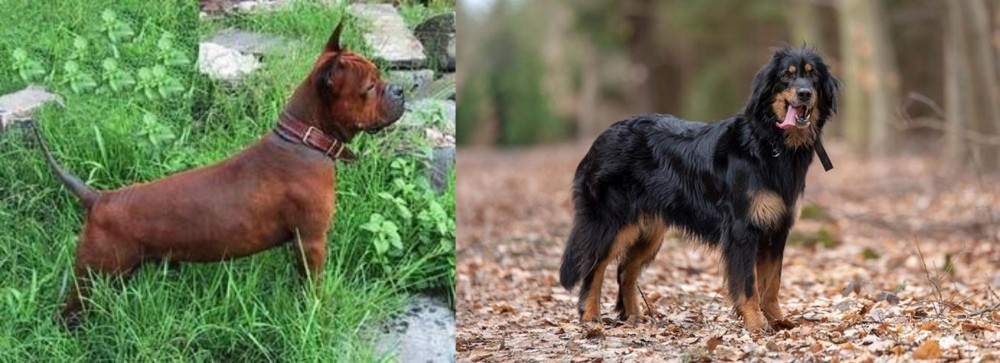 Chinese Chongqing Dog is originated from China but Hovawart is originated from Germany. Chinese Chongqing Dog may grow 22 cm / 8 inches shorter than Hovawart. Chinese Chongqing Dog may weigh 27 kg / 59 pounds lesser than Hovawart. Both Chinese Chongqing Dog and Hovawart has almost same life span. Both Chinese Chongqing Dog and Hovawart has almost same litter size. Both Chinese Chongqing Dog and Hovawart requires Low Maintenance.
Chinese Chongqing Dog is originated from China but Hovawart is originated from Germany. Chinese Chongqing Dog may grow 22 cm / 8 inches shorter than Hovawart. Chinese Chongqing Dog may weigh 27 kg / 59 pounds lesser than Hovawart. Both Chinese Chongqing Dog and Hovawart has almost same life span. Both Chinese Chongqing Dog and Hovawart has almost same litter size. Both Chinese Chongqing Dog and Hovawart requires Low Maintenance.
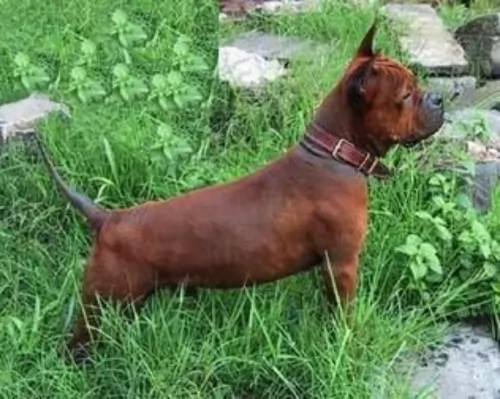 The Chinese Chongquing Dog is a very rare and unusual breed found only in China and now in Canada. The Chongquing is native to the city of Chongquing, China. This is an ancient breed that is believed to have lived in China over 2000 years ago during the Han Dynasty. It was a hunter and protector and still functions in those roles today., although there are very few left in China. Following the revolution and creation of the People’s Republic of China, the CQ Dog was only found in the rural areas of the country.
The Chinese Chongquing Dog is a very rare and unusual breed found only in China and now in Canada. The Chongquing is native to the city of Chongquing, China. This is an ancient breed that is believed to have lived in China over 2000 years ago during the Han Dynasty. It was a hunter and protector and still functions in those roles today., although there are very few left in China. Following the revolution and creation of the People’s Republic of China, the CQ Dog was only found in the rural areas of the country.
Pottery versions of the Chongquing Dog and burial figurines have been found in excavation sites from tombs of the Han Dynasty. In this isolated and mountainous area of eastern China, the dogs were unknown throughout the rest of China. Because of this the breed is relatively untouched by human intervention and is today about the same as it was 2000 years ago. There has been no interbreeding to change the natural evolution of the breed. They have their own unique personalities and temperaments.
At this time, it is believed that the Chongquing Dog is more endangered and rarer than the panda. Current breeding is diluting the breed as there are so few true bloods cross breeding and inbreeding is occurring. The knowledge of the exact breeds that contributed to the original Chongquing Dog was lost ages ago. The CQ Dog is known for loyalty, noble character, bravery and protecting its own. Today there is one kennel breeding these dogs outside China in Canada.
 The Hovawart, is a German Black Forest breed developed as a guard dog for large estates in the medieval era. They first appeared in history in the early 13th century as heroes who saved the German son of a castle lord, despite being injured themselves. The boy they saved grew up to be a German legend. He wrote the oldest German code of law that remained from medieval times. In it he names the Hovawarts as a dog that if you are responsible for hurting, stealing or killing it, you must pay for it or replace it. No other dog had this protection.
The Hovawart, is a German Black Forest breed developed as a guard dog for large estates in the medieval era. They first appeared in history in the early 13th century as heroes who saved the German son of a castle lord, despite being injured themselves. The boy they saved grew up to be a German legend. He wrote the oldest German code of law that remained from medieval times. In it he names the Hovawarts as a dog that if you are responsible for hurting, stealing or killing it, you must pay for it or replace it. No other dog had this protection.
In the late fifteenth century Hovawarts were featured in Heinrich Mynsinger’s “The Five Noble Breeds”. This guard dog breed was esteemed on a level with the hunting dogs – their health a question of life or death for their owner. In the 1500’s the popularity of the breed began to fade. The GSD or German Shepard Dog began to replace the Hovawarts as the preferred guard dog.
By the early 20th century the breed had almost disappeared but were saved by breed enthusiasts in the early 1900’s. Zoologist Kurt Konig was prominent in this effort and went looking in the Black Forest area for dogs working on farms. Using the dogs, he found on these farms, Konig began a breeding program crossing the them with Newfoundland’s, Kuvazoks, Leonbergers, GSD, an African hunting dogs and Bernese Mountain Dogs.
By 1922 the first litter of these pups was entered officially into the German Breeding Registry. In 1937 the Hovawart was recognized by the German Kennel Club. However, many members of the breed died in World War II as they were used widely by the military and not many were left by 1945. Once again breed enthusiasts came to the rescue forming a Coburg Hovawart club. This club still exists and in 1964, for the second time, the breed was recognized by the German Kennel Club. Other countries also began to take notice of this working breed.
The Hovawart has many skills in addition hunting and guarding. The Hovawart does not work for people, he works with them as he is a very independent thinker. He is also good at search and rescue and tracking. An owner of this breed must be stronger, smarter, more alert, intentional and consistent than his Hovawart. These are not dogs for the faint of heart or first-timers.
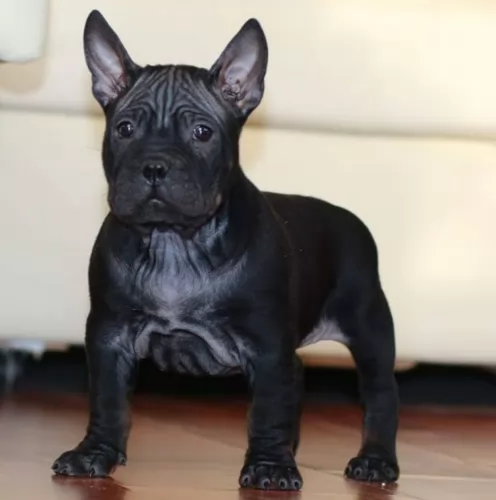 This breed is not well known, even in China. However, its likeness has been found in pottery dating back to the Han Dynasty. It is now beginning to be show in select dog shows. The general appearance upon which a current standard is being developed includes:
This breed is not well known, even in China. However, its likeness has been found in pottery dating back to the Han Dynasty. It is now beginning to be show in select dog shows. The general appearance upon which a current standard is being developed includes:
The Chongquing is a medium sized, compact and square dog that is powerful, muscular and strong. He is unique in appearance, tail and coat. His head is large, broad and flat. There are wrinkles from the muzzle to the forehead between his eyes. His eyes are brown, and the rims are black. He has high set, small ears that are triangle shape. Its frame is sturdy and strong. He is very muscular, and his strength and speed are explosive.
The Chongqing Dog can be one of three sizes: small, medium and large. All are hunters, but each hunted different prey. The appearance of all three sizes are proportionally the same.
 The Hovawart is a proud and majestic dog and his looks match his character. He looks a bit like the Golden Retriever with a powerful and broad forehead. His skull and muzzle are the same length and his nose is black. His oval eyes are a medium to dark brown and his ears are high set and triangular.
The Hovawart is a proud and majestic dog and his looks match his character. He looks a bit like the Golden Retriever with a powerful and broad forehead. His skull and muzzle are the same length and his nose is black. His oval eyes are a medium to dark brown and his ears are high set and triangular.
Their chests are strong, broad and deep. The breed has strong legs straight in front with round, strong and compact feet. They are heavy boned with dense, long coats that lie flat and have a slight wave to them. The coat can be black and gold, blond or black.
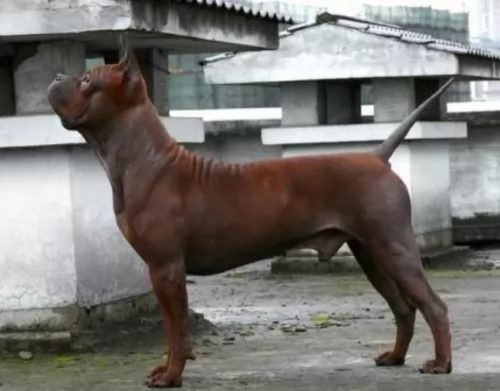 The Chongqing Dog is a confident, passionate, fearless and loyal dog. He is brave, alert, thoughtful and elegant. They make good companions for their people, but they are very wary of strangers and are ready to attack in order to protect their people. They are affectionate and loving with their people, including older children. They should never be off-leash in the company of other dogs.
The Chongqing Dog is a confident, passionate, fearless and loyal dog. He is brave, alert, thoughtful and elegant. They make good companions for their people, but they are very wary of strangers and are ready to attack in order to protect their people. They are affectionate and loving with their people, including older children. They should never be off-leash in the company of other dogs.
 They have a great sense of smell and a well-balanced personality.
They have a great sense of smell and a well-balanced personality.
They are not indoor dogs and should have a yard to run in. They do not tolerate hot weather well. They do great out in the country.
They are intelligent independent thinkers. They lengths well with positive reinforcement.
 Though their isolation protected them from genetic health issues for centuries, once they were being rejuvenated and mixed with other breeds some common issues began to show up. These include:
Though their isolation protected them from genetic health issues for centuries, once they were being rejuvenated and mixed with other breeds some common issues began to show up. These include:
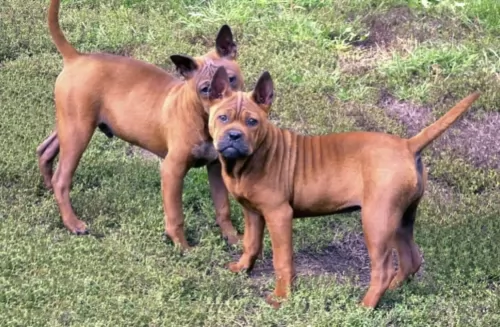 The best food for this dog is made yourself of human grade foods. Either raw or cooked yourself . This will keep their skin, teeth and coat healthy.
The best food for this dog is made yourself of human grade foods. Either raw or cooked yourself . This will keep their skin, teeth and coat healthy.
This is a really healthy breed especially due to the isolation and natural selection of their history.
He needs about 30 minutes of exercise today. He has no history of participation in canine games.
 Feed breed specific high quality dry food for puppies. Feed 1-2 cups in 3-4 meals per day
Feed breed specific high quality dry food for puppies. Feed 1-2 cups in 3-4 meals per day
Again Feed breed specific high quality dry food for adults. Feed 2-3 cups per day in 1-2 meals per day.
Points for Good Health – Stamina
The Hovawart needs plenty of exercise. Remember this is a mountain farm dog used to working all the time. Walk or jog with them daily. They can excel at field trials, obedience, search and rescue, agility, flyball, therapy dog, and service dog.